
"Stay Down Here Where You Belong" is a pacifist novelty song written by Irving Berlin in 1914, presumably in opposition to the Great War. The lyrics describe a conversation between the devil and his son, the devil exhorting him to "stay down here where you belong" because people on Earth do not know right from wrong.
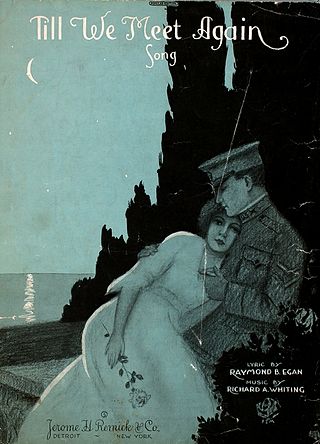
"Till We Meet Again" is an American popular song. The music was written by Richard A. Whiting, the lyrics by Raymond B. Egan in 1918. Written during the Great War, the song tells of the parting of a soldier and his sweetheart. The title comes from the final line of the chorus:
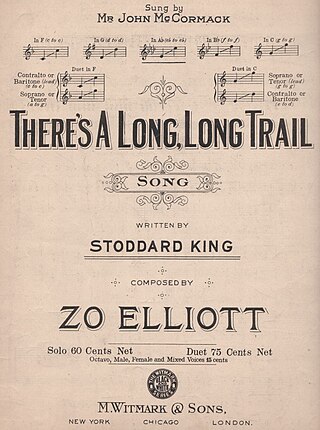
"There's a Long, Long Trail" is a popular song of World War I. The lyrics were by Stoddard King (1889–1933) and the music by Alonzo "Zo" Elliott, both seniors at Yale. It was published in London in 1914, but a December 1913 copyright for the music is claimed by Zo Elliott.
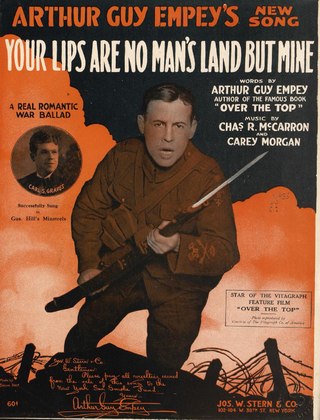
"Your Lips Are No Man's Land But Mine" is a World War I war song. It became a hit in 1918 when released by Henry Burr & Albert Campbell, charting peaking at #2 in the United States.

"Sister Susie's Sewing Shirts for Soldiers" is a World War I era song that tells about a young girl sewing shirts for soldiers fighting abroad. Her efforts are in vain however, as "Some soldiers send epistles, say they'd sooner sleep in thistles, than the saucy soft short shirts for soldiers sister Susie sews."

"Don't Take My Darling Boy Away" was a World War I era song about a mother begging a captain to not take away her son to fight. It was written by Will Dillon, composed by Albert Von Tilzer. André De Takacs designed the sheet music cover. The Broadway Music Corporation published it in New York in 1915.
"Hurrah! Hurrah for the Christmas Ship" was a World War I era song that encouraged kids to donate money, food, and clothing for European children affected by the war. It was written and composed by Henry S. Sawyer and produced by McKinley Music Co. in 1914.
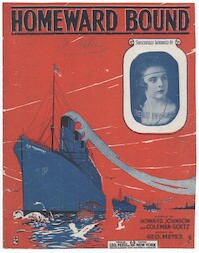
Homeward Bound is a World War I era song that says the war will soon be over, and the soldiers will be able to return home. It has a hopeful message and was meant to comfort both soldiers and the family and friends of soldiers. It was composed by George W. Meyer, written by Howard Johnson and Coleman Goetz, and produced by Leo. Feist, Inc. in 1917.

I'm Gonna Pin My Medal on the Girl I Left Behind is a World War I era song about a soldier named Johnny dreaming of coming home and giving his medal to his sweetheart. The song was first featured in Ziegfeld Follies of 1918. It reached the top 20 in August 1918 and climbed even higher to number 14 in September 1918. It was written and composed by Irving Berlin, produced by Waterson, Berlin & Snyder Co., and recorded by the Peerless Quartet. The song is listed as part of the US Library of Congress Recorded Sound Research Center (16,626), the National Jukebox (16,441) and the Recorded Sound Section, Library of Congress (6,098)

"Bring Me a Letter from My Old Home Town" is a World War I era ballad song released in 1918. A.G. Delamater wrote the lyrics and Will R. Anderson composed the music. It was written for both voice and piano.

"Break the News to Mother" is a war song first released in 1897. The song was popular during the Spanish–American War, and re-released during World War I. It is sometimes erroneously believed to be an American Civil War song. Charles "Chas" K. Harris wrote the lyrics and composed the music. The song was originally published by Harris in New York, New York.

Uncle Sammy, Take Care of My Girl is a World War I song released in 1918. Betty Morgan wrote the lyrics. Jimmie Morgan composed the music. The song was published by F.J.A. Forster of Chicago. On the cover of the sheet music is a soldier in a trench, writing a letter. The smoke of the fire has a drawing of Uncle Sam reading the letter to a woman. There is also a photo of the lyricist and composer. Artist Dan Sweeney designed the cover. Another version of the cover shows a soldier in the upper right-hand side, writing a letter. In the lower left corner, Uncle Sam offers the letter to a woman. A photo of the lyricist and composer are also featured on the cover. It was written for both voice and piano.

"Bring Back My Daddy To Me" is a World War I era song released in 1917. William Tracey and Howard Johnson wrote the lyrics. George W. Meyer composed the music. Leo Feist, Inc. of New York, New York published the song.

"And He'd Say, 'Oo-La-La! Wee-Wee!'" is a World War I era song released in 1919. Lyrics and music were written by George Jessel and Harry Ruby. William Baker arranged the song. It was published by Waterson, Berlin & Snyder, Inc. of New York, New York. The song was written for voice and piano.
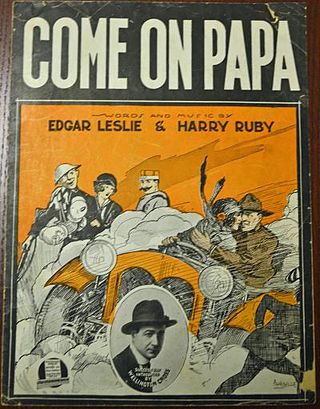
"Come On Papa" is a World War I era song released in 1918.

General Pershing: is a march composed in 1918 by Carl D. Vandersloot and published by Vandersloot Music Publishing Company.

"I Wonder Who's Knitting for Me" is a World War I song written by Raymond Leveen and composed by Jessie Winne. It was published in 1917 by Winne Music Co. in New York City. The sheet music cover, illustrated by Starmer, depicts a soldier imagining a woman knitting for him, and features an inset photo of Bert Fitzgibbons.
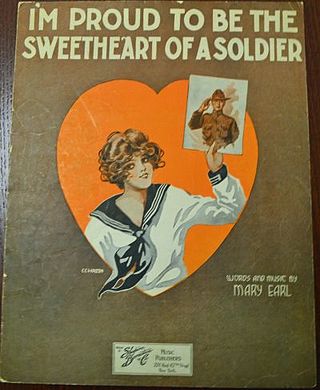
"I'm Proud to Be the Sweetheart of a Soldier" is a World War I song written and composed by Mary Earl. This song was published in 1918 by Shapiro, Bernstein & Co. Inc., in New York City. The sheet music cover, illustrated by E. E. Walton, depicts a young woman in a sailor outfit holding a picture of a soldier.

"I'm Hitting the Trail to Normandy: So Kiss Me Goodbye" is a World War I song written and composed by Charles A. Snyder and Oscar Doctor. The song was published in 1917 by Snyder Music Co. in New York City. The sheet music cover, illustrated by E. H. Pfeiffer, depicts a soldier kissing a woman good-bye with an inset photo of Paul Elwood.

"If I Had a Son for Each Star in Old Glory " is a World War I song written by James E. Dempsey and composed by Joseph A. Burke. This song was published in 1917 by Leo Feist, Inc., in New York City. The sheet music cover, illustrated by Rosenbaum Studios, features a mother looking at a picture of her son with an inset photo of Monte Austin. Other editions feature Brice and King; Buddy Clark; Ben Davis; and Florence Timponi.



















